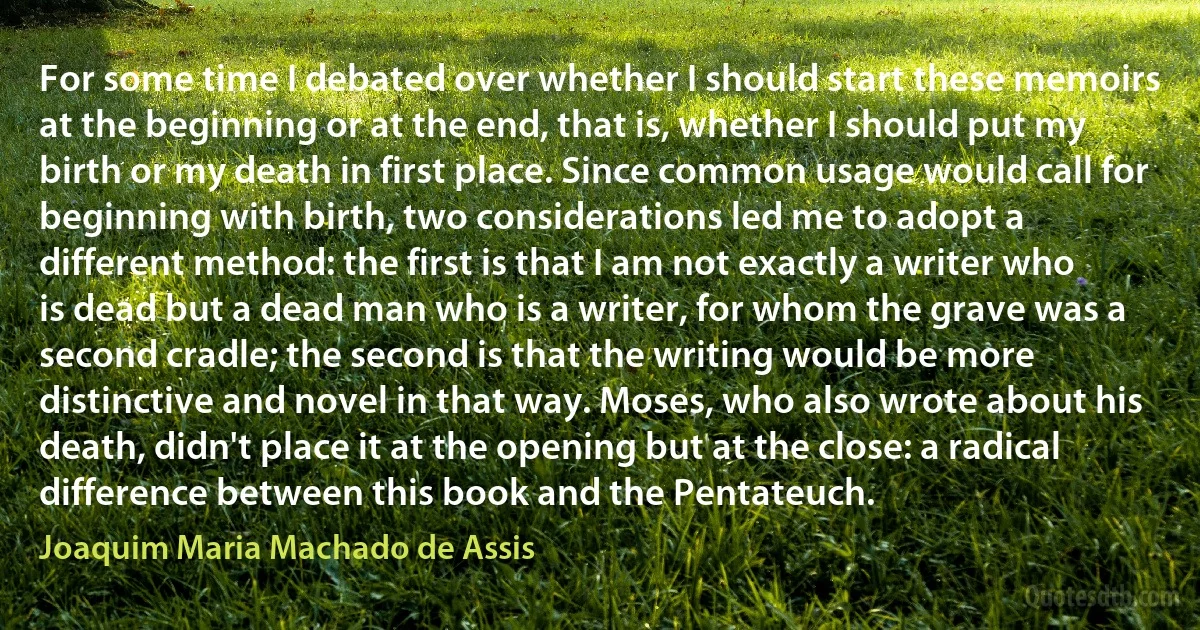
For some time I debated over whether I should start these memoirs at the beginning or at the end, that is, whether I should put my birth or my death in first place. Since common usage would call for beginning with birth, two considerations led me to adopt a different method: the first is that I am not exactly a writer who is dead but a dead man who is a writer, for whom the grave was a second cradle; the second is that the writing would be more distinctive and novel in that way. Moses, who also wrote about his death, didn't place it at the opening but at the close: a radical difference between this book and the Pentateuch.
Joaquim Maria Machado de AssisRelated topics
beginning birth book call close common cradle dead death difference different distinctive end grave led man memoirs novel pentateuch place second should start time wayRelated quotes
You can have a team of unconventional thinkers, as well as conventional thinkers. If you don't have the support of others you cannot achieve anything altogether on your own. It's like a cry in the wilderness. In each instance there were others who could see the same thing, and there were others who could not. It's an obvious difference we see in those who you might say have a bird's eye view, and those who have a worm's eye view. I've come to realize that we all have a different mind set, we all see things differently, and that's what the human condition is really all about.

Jonas Salk
It is almost irresistible for humans to believe that we have some special relation to the universe, that human life is not just a more-or-less farcical outcome of a chain of accidents reaching back to the first three minutes, but that we were somehow built in from the beginning. ... It is very hard to realise that this is all just a tiny part of an overwhelmingly hostile universe. It is even harder to realise that this present universe has evolved from an unspeakably unfamiliar early condition, and faces a future extinction of endless cold or intolerable heat. The more the universe seems comprehensible, the more it also seems pointless.

Steven Weinberg
What is a charitable heart? It is a heart which is burning with love for the whole creation, for men, for the birds, for the beasts ... for all creatures. He who has such a heart cannot see or call to mind a creature without his eyes being filled with tears by reason of the immense compassion which seizes his heart; a heart which is softened and can no longer bear to see or learn from others of any suffering, even the smallest pain being inflicted upon a creature. That is why such a man never ceases to pray for the animals ... [He is] ... moved by the infinite pity which reigns in the hearts of those who are becoming united with God.

Isaac the Syrian
I don't know what monetarism is. If monetarism just means a good old-fashioned quantity theory, of course it has not failed. If it means the particular version of Milton Friedman, I think it has because he imagines that he can achieve - ascertain - a clear quantity relationship between a measurable quantity of money and the price level. I don't think that is possible. In fact, just about 40 years ago in the opening sentences of my book, Prices and Production, I wrote that it would be a great misfortune if people ever cease to believe in the quantity theory of money. It would be even worse ever to believe it literally. And that's exactly what Milton Friedman does.

Friedrich Hayek
Yet in all this time, from the beginning to the end, I had two manner of beholdings. The one was endless continuant love, with secureness of keeping, and blissful salvation, - for of this was all the Shewing. The other was of the common teaching of Holy Church, in which I was afore informed and grounded - and with all my will having in use and understanding. And the beholding of this went not from me: for by the Shewing I was not stirred nor led therefrom in no manner of point, but I had therein teaching to love it and find it good : whereby I might, by the help of our Lord and His grace, increase and rise to more heavenly knowing and higher loving.

Julian of Norwich
